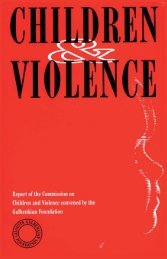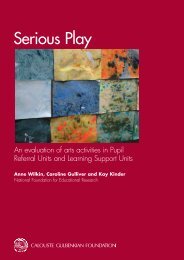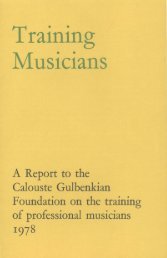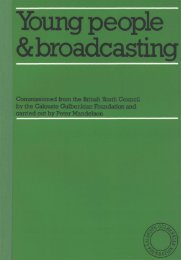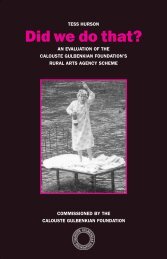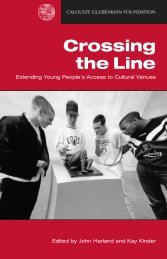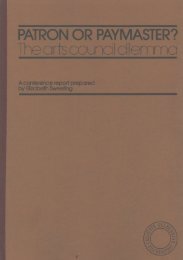Why Restorative Justice? - Calouste Gulbenkian Foundation
Why Restorative Justice? - Calouste Gulbenkian Foundation
Why Restorative Justice? - Calouste Gulbenkian Foundation
You also want an ePaper? Increase the reach of your titles
YUMPU automatically turns print PDFs into web optimized ePapers that Google loves.
THE NEED FOR CHANGE<br />
appear as witnesses. Hence the reluctance of so many witnesses<br />
and victims to report crimes, make statements or testify in court.<br />
Even when victims are awarded compensation, the impact of<br />
suffering on those who may depend on them is often left out of the<br />
calculation. Moreover victims with a criminal record receive<br />
reduced or no compensation from the Criminal Injuries Compensation<br />
Authority. Once convicted of a crime, it would seem that a<br />
person’s right to be considered a victim is greatly diminished. And<br />
yet the line between victim and offender is seldom so clear.<br />
For offenders, the court process does the opposite of what is<br />
intended. It can help to distance them from what happened.<br />
Although the spotlight is on the person in the dock, the offender<br />
takes little part in the proceedings. Watching passively as their lives<br />
are discussed in complicated language by strangers, offenders often<br />
cannot hear or understand what is going on. It is their lawyer’s job<br />
to argue on their behalf and get them off, whether they are guilty<br />
or innocent. Sometimes their lawyer may even blame the victim for<br />
bringing ‘the crime’ on themselves, as in many rape cases.<br />
The threat of serious punishment makes the legal system<br />
mindful of protecting the rights of the accused. But this often<br />
defeats the goal of accountability. So some guilty people plead not<br />
guilty in the hope of escaping punishment. Others plead guilty<br />
to reduce their sentence, rather than out of remorse and a desire to<br />
make good the harm they have done. When they do this as a tactic,<br />
it is not only the state that loses, but the victim and the community.<br />
The offender, if found guilty, is given a sentence, but in some<br />
cases their families are also punished. For example, mothers are<br />
imprisoned even for relatively minor offences, despite the impact<br />
on their children. Wage earners who support whole families have<br />
their livelihoods put at risk even by short sentences, imposed to<br />
‘teach them a lesson’ rather than to protect the community. The<br />
longer-term damage to the offender’s family is ignored.<br />
The courts are often accused of unfairness by both victim and<br />
offender. The convicted person and their supporters may see the<br />
sentence as unjustly heavy, while the victim and their friends see<br />
it as too soft. The local media may chime in with their disapproval.<br />
This leaves magistrates or judges in a ‘no-win’ situation where the<br />
sentences they pass are criticised on all sides.<br />
This dissatisfaction is compounded if, as often happens, the<br />
14







